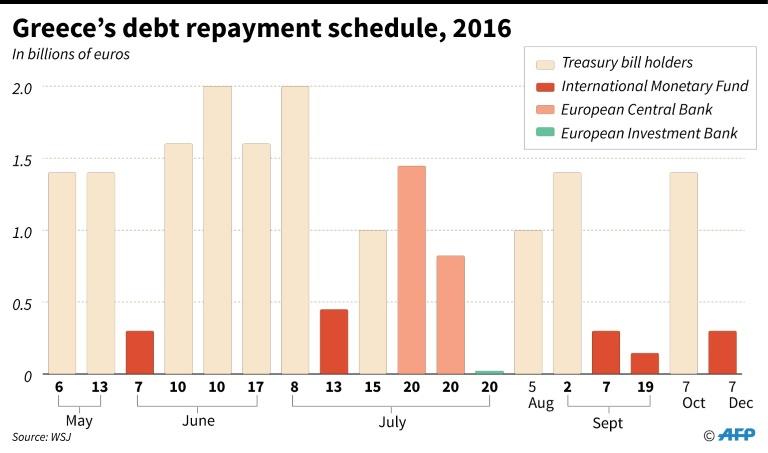
Greece, Brexit in focus at ECB meeting in Vienna
Meeting in the Austrian capital instead of its home venue in Frankfurt, the ECB's decision-making governing council also said it was slightly more optimistic about the outlook for inflation and growth in the euro area this year.
But ECB chief Mario Draghi urged eurozone governments to boost their reform efforts if the central bank's stimulus measures were to make themselves felt fully.
On the policy front, the ECB decided not to alter borrowing costs, which have been at zero percent since March.
No such moves had been expected following a raft of different stimulus moves three months ago.
Instead, Greece and Britain formed the focus of attention at the traditional post-meeting news conference.
In the run-up to the meeting there had been talk that the ECB might allow Greek banks to participate in its regular refinancing operations, from which they had been barred for more than a year.
ECB President Mario Draghi acknowledged that the issue had been discussed.
- 'No decision' on Greece -
"We had a presentation, but we had no decision," he said.
"The governing council acknowledges the significant progress made in the last few months," Draghi said, but insisted that Greece had to implement the agreed reforms before any action could be taken.
"Once the prior actions will be implemented, the governing council will take a decision" to effectively allow Greek banks to participate again in the regular refinancing operations, he said.
Normally, in these, banks receive cash in the form of very low interest loans in return for "collateral" -- high-quality assets, preferably sovereign bonds, placed at the central bank as guarantee.
But given the desperate state of Greece's finances, its sovereign bonds have been classified as "junk" for some years, and are not normally eligible to be used as collateral.
Initially, in May 2010, the ECB granted Greek banks a special waiver to get around this problem, allowing them to use Greek sovereign bonds as collateral, as long as Athens kept to the terms of its international bailout programme.
But when Alexis Tsipras and his radical Syriza party stormed to power in January 2015, threatening to rescind on the terms of its international bailout, the ECB suspended that waiver in February 2015 until the new government in Athens could thrash out a new deal with its creditors.
Since then, Greek banks have been kept afloat via the Emergency Liquidity Assistance or ELA programme, which is much more expensive for them.
- Preparing for possible 'Brexit' -
Draghi was also quizzed about a possible "Brexit" as Britain prepares to vote on whether to remain in the EU on June 23.
He revealed that contingency plans had been drawn up to prepare the possible economic shock that a "leave" vote would trigger.
"The ECB has a view that the UK should remain in the EU. Both the UK and the EU benefit," Draghi said.
But it was the choice of British voters and "the ECB is ready for all contingencies," he said.
Regarding the economic outlook, Draghi revealed that the ECB was becoming slightly more optimistic about prospects for growth and inflation in the single currency area.
Draghi said the ECB expected area-wide inflation to average 0.2 percent in 2016, and then accelerate to 1.3 percent in 2017 and 1.6 percent in 2018.
The ECB calculates that inflation rates of close to but just under 2.0 percent are conducive to healthy economic growth.
At the same time, eurozone growth would average 1.6 percent this year, and 1.7 percent both next year and the year after, Draghi said.
Nonetheless, "in order to reap the full benefits from our monetary policy measures, other policy areas must contribute much more decisively, both at the national and at the European levels," he said.
"No big surprises were expected for today's ECB meeting and no big surprises were delivered," said Natixis economist Johannes Gareis.
ING DiBa economist Carsten Brzeski agreed.
"With an uncertain few weeks ahead, owing to the British referendum, the ECB played it safe and kept all options open," he said.

Legal Disclaimer:
MENAFN provides the
information “as is” without warranty of any kind. We do not accept
any responsibility or liability for the accuracy, content, images,
videos, licenses, completeness, legality, or reliability of the information
contained in this article. If you have any complaints or copyright
issues related to this article, kindly contact the provider above.


















Comments
No comment